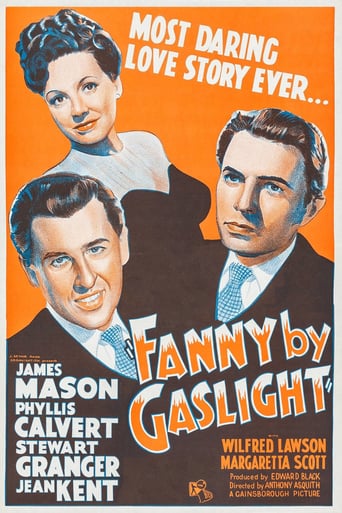alice liddell
Poorly paced, but highly entertaining, and quite thought-provoking melodrama. It is typical Gainsborough fare: shrouded Victorian settings; innocent, swooning heroines, who have the most godawful horrors thrown at them in an unenviably short stretch of time; 'dashing' (i.e. stilted) heroes; arousingly sadistic villains played by James Mason; the intrusion of music hall cheek into an already vulgarised 'gentility'; good-hearted Cockney servants, here called Chunks; a brazenly frank, unheard of in contemporary Hollywood, treatment of sexuality.In many ways, FANNY comes straight out of Victorian melodrama. The hypocrisy of Victorian England as essayed in Dickens and Conan Doyle is rife here: the delicate pattern of respectability is shown to be infinitely fragile. This is why the accumulation of Fanny's traumas is so plausible - one toppling domino of the edifice of respectability leads to a complete and far-reaching collapse.The result is a failure of patriarchy, an oppression split against itself. Look at the frightening scene where Fanny's 'real' father is shown in splintered mirror reflection - the pressure turns him, Jekyll-and-Hyde-like, from a feckless, passive fraud, into a figure from a horror film, as he foresees his own death, the only option to his self-created web of deceit (wow, you really do get into it!). Fanny's first family home stands over her supposed father's burlesque house, home to many of the Victorian great and good. The fact that she has two fathers emphasises this pervasive dichotomy.Women, in this double world, have only two options open to them, and they have a rotten deal in both. If they try to live with integrity and decency, like Fanny, they are buffeted, nay fairly walloped by a most malevolent Fate (or the workings of a corrupt social machination, whatever you want to call it). Fanny's swoonings are less conventional Victoriana than blows dealt by forces beyond her.If, on the other hand, women transgress, like Lucy, or her father's wife (both, appropriately, if cheerfully xenophobically, linked to Frenchness), they are equally vulnerable to caprice, as their lovers turn against them, or abandon them. The film is also very good on how the idea of 'woman' is constructed in patriarchal society - there are many elaborate scenes of dressing and undressing, distortions of 'natural' femininity. Class construction is analysed too, also limiting and defeating men.
The title of the film might seem oblique, or merely atmospheric, until we note all the gaslamps standing suggestively between characters; part of a wider phallic plot, seen most interestingly, less obviously, between Stewart Granger and James Mason. Mason is perversely the most sympathetic character in the film. I say perversely, because, for the first hour and a half, he is a real monster, a glorious, diabolical, handsome, unredeemably vicious, incredibly sexy monster, who clearly has the filthiest, and most elaborate, Sadean sex ever. He is the ultimate transgressor, taboo in both the Underworld and respectable society, the two being complicit in the same corrupting system. He is only on screen in annoyingly , if appropriately brief, spurts - the first fifteen minutes of the film is electrifying entertainment. He is an aristocrat, locus of all the fears, yet desires (and 1940s British women worshipped him) of the British middle classes.But when he goes to France - as all four protagonists do: it is a site of freedom from the ubiquitous repression of Britain, but also the ultimate venue of closure where everything is fatally brought to a head - he becomes a much more understandable, tragic figure. We see he has been demonised by respectable society as a demonic Id that must be cast out. His reduction from malevolent swaggerer to simian depressive is a shock to behold. His forcing of the duel is less a matter of honour than a poignant wishing for death. Mason is outstanding, turning a potential caricature into a figure of far greater depth. He is the Fassbinder hero of this melodrama, the tormented transgressor; not the two protagonists, whose desire for conventionality will only replicate the system that tortured them in the first place.What is finally remarkable about the film is how these issues managed to get aired at the height of World War II. Gainsborough films were by far the most popular among British audiences at a time when duty, austerity, self-denial was mandatory. These films, and especially FANNY, by contrast, became the focus of all those repressed desires - a dissatiafaciton with authority and patriarchy; the thrill of (particularly female) transgression; the impulse to excess; a rejection of duty and tradition; all the things in real life audience members were supposed to be defending. Is it any surprise Labour got in the following year? That is why the films, beyond their stereotypical melodrama, remain enduringly fascinating. Just more James Mason, please...mmm.


